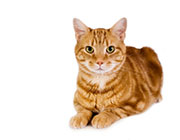
THURSDAY, May 21, 2015 (HealthDay News) — Sick cats appear to have a better chance of survival if they have higher levels of vitamin D, a new study reveals.
The findings suggest that cats could help scientists learn more about the link between vitamin D and people’s health, according to the researchers at the University of Edinburgh in Scotland.
However, the study was only designed to find an association between vitamin D levels and a feline’s odds of surviving a life-threatening illness. It couldn’t prove a cause-and-effect relationship.
Results of the study were published online recently in the journal PLOS One.
The researchers checked blood samples from almost 100 pet cats hospitalized with life-threatening conditions. Those with higher levels of vitamin D in their blood were more likely to be alive 30 days after hospital admission than those with the lowest levels, the study found.
Veterinarians might be able to check cats’ vitamin D levels to predict which ones are most likely to survive an illness, the researchers suggested.
“At the moment, it is difficult for veterinarians to offer accurate prognostic information to the owners of sick cats. Our study demonstrates that measuring a key vitamin D metabolite in the blood predicts disease outcome with a much greater degree of accuracy than many other widely used measures of disease severity,” Richard Mellanby, head of small animal medicine at the university’s School of Veterinary Studies, said in a university news release.
The researchers added that further study is needed to learn more about whether vitamin D reduces cats’ risk of disease and whether adding vitamin D to a hospitalized cat’s diet might affect their chances of survival.
Previous studies have linked low vitamin D levels to a number of health problems in people, including infections, cancer and multiple sclerosis.
Exposure to sunshine triggers vitamin D production in people. Vitamin D is also found in foods such as oily fish, cheese and egg yolks. Vitamin D supplements are another option for people who have too little of the sunshine vitamin.
Cats, however, only obtain vitamin D from food, the study authors noted.
“It is important to remember that too much vitamin D can be poisonous to cats. Most cat foods contain a standard amount of vitamin D and there is no need for owners to add supplements,” he added.
More information
The U.S. National Institutes of Health has more about vitamin D.
Copyright © 2026 HealthDay. All rights reserved.

